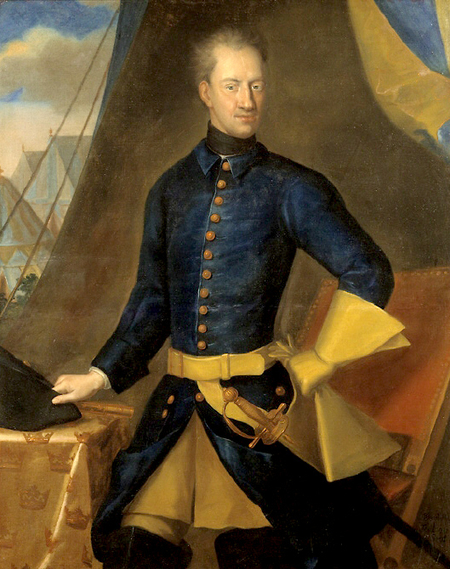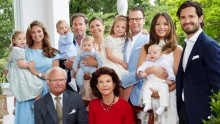Den/The Day continues the discussion on the efficiency and democratic nature of the institution of monarchy in Europe. We first cited the UK as an example. In the article titled “Monarchistic Idea in the 21th Century,” we noted that “for a great part of Britons, the crown is not just a historical souvenir, but also an institution, quite efficient and necessary in the world of today.” On the other hand, Den’s contributor, philosopher Andrii Baumeister offered arguments about the modernity of monarchy (Den, No. 78-79). In the issues of The Day No. 32 (May 23, 2017), No. 36 (June 8, 2017), and No. 38 (June 15, 2017), we examined the role of monarchy in Denmark, the Netherlands, and Spain, respectively. Now we offer our readers a glimpse into the link between the past and the present in the Kingdom of Sweden.
ON PARTICULARITIES OF THE SWEDISH MONARCHY
“Our monarchy was founded five centuries ago by Gustav Vasa who was the first king whose office as head of the Swedish state became hereditary. Gustav Vasa himself was elected as king on June 6, 1523,” Henrik NORBERG, Deputy Head of the Mission, Counselor at the Swedish Embassy in Ukraine, told The Day. In his words, Gustav Vasa is not considered a great ancestor of Swedish kings because there were some major changes after him, several other dynasties ruled, and the country is now a constitutional monarchy in which the king was elected.
Mr. Norberg pointed out that there is very much in common between Scandinavian monarchies because they have been maintaining close ties and relations. He also said that the Swedish king is a cousin of the Danish queen.

THE STOCKHOLM PALACE (PICTURED RIGHT), THE HOUSE OF PARLIAMENT (PICTURED LEFT), THE NATIONAL MUSEUM AND THE DOME OF THE SKEPPSHOLMEN CHURCH (IN THE BACKGROUND) / Photo from the website WIKIPEDIA.ORG
“Another important aspect of the Swedish monarchy is that we are fully aware that, even though the king is formally the head of state, he plays no political role. I think if the Swedish monarchy had a real impact on political life in Sweden, there would be much more skepticism about this kind of system,” the diplomat said.
65 PERCENT OF SWEDES FAVOR THE PRESERVATION OF MONARCHY
“For me as a Swedish citizen,” Mr. Norberg continues, “it is interesting that, if we were to create a new state in Sweden, many Swedes would agree to have the head of state who would inherit this office from his or her father or mother. On the other hand, almost 65 percent of Swedes in fact favor monarchy and wish this political system to be preserved.
“We don’t have many political parties, but the programs of some of them contain a call for establishing a republic. In practice, these parties do not put this question high on the agenda because very few people will prefer a republic. Today, this is not a political problem that would divide the Swedes, and there are no disputes about it in parliament.”
THE KING IS A SYMBOL OF SWEDEN’S UNITY
“Almost 100 years ago, the last attempt of a Swedish king to influence politics stirred up a crisis,” the diplomat says. “This occurred during the debates on Sweden’s military budget in 1914. As World War One was breaking out in Europe, the king said it was necessary to increase military expenditures. This political attitude provoked a crisis, and that was the last time a king ever tried to be involved in political activity.
“In 1970 we reached a political compromise, when it was stated clearly that the king or queen of Sweden would never voice political opinions or views or take a certain attitude in political matters. This means that the king is supposed to perform a basically ceremonial function, i.e., represent the country. The king is a symbol of the state’s unity.

CHARLES XII WHO RULED SWEDEN FROM APRIL 5, 1697, UNTIL NOVEMBER 29, 1718 / Photo from the website WIKIPEDIA.ORG
“Another reason why the Swedes are taking a positive attitude to monarchy is popularity of the royal family. Public opinion polls show that the current Crown Princess Victoria, who will become the queen one day, is Sweden’s most popular person. People trust her very much. So what plays a certain role in the popularity of monarchy is personal affection and also, in some cases, the fact that the Swedish monarchy is not viewed as a threat to democracy.”
“OUT OF THE WORLD’S SIX MOST DEMOCRATIC COUNTRIES, FIVE ARE MONARCHIES”
“We have reached a major compromise to preserve this historical institution in the current governmental setup, where the king is the head of state, the parliamentary speaker holds the second most important office, and then comes the prime minister,” Mr. Norberg notes. “The king opens some political sessions but does not in fact take part in them.
“It is difficult to draw a line between the development of democracy and the existence of monarchy in Sweden. If you look at the past year’s research into the level of democracy in the world, you will see that, out of the world’s six most democratic countries, five are monarchies, and the sixth is Finland. I think it was difficult to establish a direct link between democracy and monarchy.
“But it is quite obvious that this works very well together – full-fledged democracy and the head of state who inherits his or her office.
“Swedish kings or queens have always had to maneuver between parliament, public opinion, and sympathies and could not dominate over them. We had a very short period of real autocracy, when the king wielded total power. Obviously, the Swedish public does not accept a dictatorial style of government, so power should moderate.”
ON THE ROLE OF THE ROYAL FAMILY
In Mr. Norberg’s view, the role of the royal family is to be a symbol of national unity. “Sweden has gone through many, sometimes ruinous, changes and crises. For example, a lot of Swedish tourists died during a tsunami in South-Eastern Asia, mostly in Thailand. Whenever this kind of national crises occurred, the king in fact managed to become a symbol of unity and consolation. He has really united the Swedes with a new changing Sweden. For a lot of Swedes were born outside Sweden – they are refuge-seekers or migrants, and this creates a permanent variety of unity that can exist for decades or centuries.
“We can see annual documentary films on the royal family. For example, the 2016 film is very popular among the Swedes.”
The royal family is mainly funded at the parliament-approved budgetary expense. In other words, the royal family lives off the taxpayers’ money. It is not a large amount. In comparison with other monarchies, the Swedish one is not the most expensive, the diplomat points out. In his words, some studies claim that the royal family brings money to Sweden because it plays an important role by making state visits.
Mr. Norberg noted that, during his visit to Ukraine nine years ago, King Carl XVI Gustaf was accompanied by the executives of many companies, who signed contracts. This creates a certain attractive factor of monarchy, which contributes to high-profile business deals.
“Speaking of the history of Scandinavian countries, we were often part of one kingdom that embraced Sweden, Finland, and Denmark.
“Of course, our history also knows a not so successful cooperation between Charles XII and Hetman Mazepa in the Battle of Poltava. So there have been certain links between our countries, which helps me develop Swedish-Ukrainian cooperation in my work.”
As for the desire of some of our people to have a strong leader or even a tsar, there are very few people in Sweden who are taking this position. The latest sociological surveys show that this also applies to Ukraine. Most of the Ukrainians believe that this country should move towards a pluralist democratic society instead of wanting a strong leader with extensive powers. “I believe that, in the future, power must not be concentrated in one person,” the Swedish diplomat pointed out.








